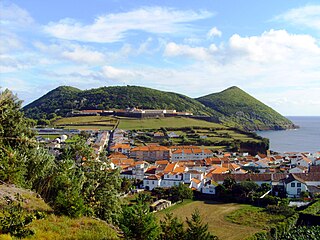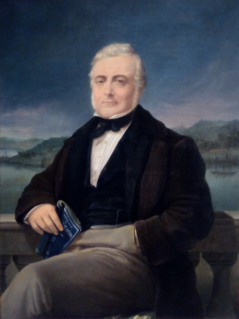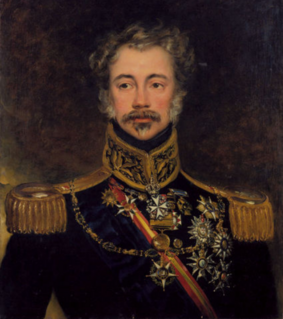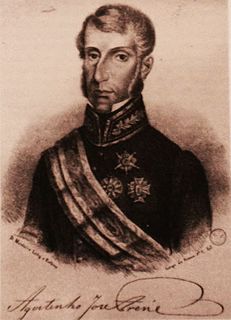Related Research Articles

Dona Maria II "the Educator" or "the Good Mother", reigned as Queen of Portugal from 1826 to 1828, and again from 1834 to 1853. Born in Rio de Janeiro, she was the first child of Emperor Dom Pedro I of Brazil and Empress Dona Maria Leopoldina, and thus a member of the House of Braganza. One of the two surviving children born when Pedro was still heir apparent to Portugal, she inherited Portuguese titles and was placed in the line of succession to the former Portuguese throne, even after becoming a member of the Brazilian Imperial Family, from which she was excluded in 1835 after her definitive ascension to the Portuguese throne.

João Baptista da Silva Leitão de Almeida Garrett, 1st Viscount of Almeida Garrett was a Portuguese poet, orator, playwright, novelist, journalist, politician, and a peer of the realm. A major promoter of theater in Portugal he is considered the greatest figure of Portuguese Romanticism and a true revolutionary and humanist. He proposed the construction of the D. Maria II National Theatre and the creation of the Conservatory of Dramatic Art.

José Lúcio Travassos Valdez, only Baron and first Count of Bonfim, was a Portuguese soldier and statesman.

Joana of Portugal was Queen of Castile as the second wife of King Henry IV of Castile. The posthumous daughter of King Edward of Portugal and Eleanor of Aragon, she was born in the Quinta do Monte Olivete Villa, Almada.
The highest hereditary title in the Portuguese monarchy. By tradition, there are a total of five royal and seven non-royal dukes in Portugal, out of 28 dukedoms that have ever been created. In the majority of cases, the title of duke was attributed to members of the high nobility, usually relatives of the Portuguese Royal Family, such as the second son of a monarch.

D. Pedro de Sousa Holstein, 1st Duke of Faial and Palmela was one of the most important Portuguese diplomats and statesmen in the first half of the 19th century. He also served as the country's first modern Prime Minister.

Luís da Silva Mouzinho de Albuquerque was a Portuguese military officer, engineer, poet, scientist and politician, who distinguished himself during the Liberal Wars and in the conflicts that marked Portugal's history in the first half of the 19th century. He served as the Minister of the Kingdom during the liberal regency of Pedro of Braganza. This was the most prominent post inside the government at that time, which made him the Prime Minister of Portugal in all but name. He was also several times minister and deputy minister during the Constitutional Monarchical period. Among other offices, he served as Chief of the National Mint, captain-general and governor of Madeira, and inspector-general of public works. He was the grandfather of Joaquim Augusto Mouzinho de Albuquerque, a military officer and colonial administrator.

Francisco Manuel Trigoso de Aragão Morato, best known as Francisco Trigoso was a Portuguese liberalist politician. He presided over the Portuguese government from 1 August to 6 December 1826.

The Fortress of São João Baptista, also known as the Fort of São Filipe or Fort of Monte Brasil is a historic fortress and defensive emplacement, located in the civil parish of Sé, municipality of Angra do Heroísmo in the Portuguese island of Terceira, archipelago of the Azores.

António José de Ávila was a Portuguese politician, minister of the kingdom, mayor of the city of Horta, on the island of Faial, in the Azores, Civil Governor of the same, Peer-of-the-Realm, Minister of State, and later Ambassador to Spain.

The Duke of Palmela is a Portuguese title granted by royal decree of Queen Maria II of Portugal, dated from October 18, 1850, to Dom Pedro de Sousa Holstein (1781-1850), a Portuguese politician during the first half of the 19th century. He was President of the Council of Ministers and a remarkable Ambassador in London and to the Congress of Vienna.

Duke of Faial was a Portuguese title of nobility, named for Faial Island in the Azores, which was granted by royal decree of Queen Maria II of Portugal, dated from 4 April 1833, to Pedro de Sousa Holstein, a 19th century politician who served as Portugal's first prime-minister. Two months later, on 16 June, Sousa Holstein successfully petitioned the Queen to change the title from Duke of Faial to Duke of Palmela, which he used for the rest of his life.
João Soares de Albergaria de Sousa, frequently referred to as João Soares de Albergaria, was a liberal politician, rural landowner, and author of the 1822 manifesto Corografia Açórica, the first thesis on Azorean regional sovereignty.

Manuel da Silva Passos was a Portuguese jurist and politician, one of the most notable personalities of 19th-century Portuguese Liberalism. He is more commonly referred to as Passos Manuel, due to the way he was addressed in Parliament, where members were announced by their surname — "Manuel" being apposed to his surname in order to distinguish him from his brother, José da Silva Passos, who was also a member of Parliament.

The Rossio Massacre took place on the evening of 13 March 1838, when forces loyal to the Portuguese government of Prime Minister Sá da Bandeira put down a revolt by radical sections of the National Guard and their supporters, who were gathered in Rossio Square in central Lisbon. Around 100 people were killed, and an unknown number injured. Contemporary accounts agree on the events leading up to the massacre, but differ in their description of how it took place and who the victims were.

The Belenzada was an attempted coup in November 1836 by Queen Maria II of Portugal and her husband Ferdinand II to remove the liberal government established by the September Revolution and reinstate the Constitutional Charter of 1826. Despite enjoying diplomatic support from the United Kingdom and Belgium, the attempt was frustrated by the determination of the National Guard, the regular army and the general population of Lisbon.

The Revolt of the Marshals was an unsuccessful Chartist military coup in Portugal against the Setembrist government of António Dias de Oliveira in 1837. It was led by marshals Saldanha and Terceira. Ultimately the rebels lacked the numbers to succeed, and failed to raise any support in Lisbon.

Agostinho José Freire ComTE, CvA, GCNSC was an major of the Portuguese Army, minister and state councilor, a distinguished statesman and advocate of the Liberal cause.
References
- ↑ Douglas L. Wheeler (August 1998). Republican Portugal: A Political History, 1910-1926. Univ of Wisconsin Press. p. 322. ISBN 978-0-299-07454-8.
- 1 2 Gabriel Paquette (14 March 2013). Imperial Portugal in the Age of Atlantic Revolutions: The Luso-Brazilian World, c.1770–1850. Cambridge University Press. ISBN 978-1-107-32859-4.
- 1 2 3 4 Jose Baptista de Sousa (22 February 2018). Holland House and Portugal, 17931840: English Whiggery and the Constitutional Cause in Iberia. Anthem Press. ISBN 978-1-78308-757-0.
- ↑ O ecco: jornal crítico, litterario e político. 1839. p. 6792.
- ↑ Arqnet
- ↑ Macedo Gomes, Eduardo Miguel. "A Administração Local na Monarquia Constitucional. O Papel da Freguesia e do Pároco (1834-1910)" (PDF). uminho.pt. Universidade do Minho. Retrieved 29 April 2019.
- ↑ Maria de Fátima Bonifácio (2015-06-23). O Primeiro Duque de Palmela. D. QUIXOTE. ISBN 978-972-20-5772-1.
- ↑ Anas, António. "S. LUÍS, Frei Francisco de (Cardeal Saraiva) (Ponte de Lima, 1766 – Lisboa, 1845)" (PDF). dichp.bnportugal.gov.pt. Dicionario de Historiadores Portugueses. Retrieved 29 April 2019.
- ↑ João Baptista]. [Felgueiras (1837). Resumo historico da vida e tragico fim de Agostinho Joze Freire. Typ. patriotica de C.J. da Silva e comp.a. pp. 10ff.
- 1 2 3 4 5 6 7 8 9 10 11 12 13 14 15 16 17 18 19 20 21 Noticia dos ministros e secretarios d'estado do regimen constitucional nos 41 annos decorridos desde a regencia installada na ilha terceira em 15 de março de 1830 até 15 de março de 1871. Imprensa Nacional. 1871. pp. 21–.
- ↑ Paiva Monteiro, Ofélia. "Edição Crítica das Obras de Almeida Garret". uc.pt. Universidade de Coimbra. Retrieved 29 April 2019.
- ↑ "Vila Real (D. José Luís de Sousa Botelho Mourão e Vasconcelos, 1.º conde de)". arqnet.pt. Portugal Dicionaro Historico. Retrieved 29 April 2019.
- ↑ "Linhares (D. Vitorio Maria Francisco de Sousa Coutinho Teixeira de Andrade Barbosa, 2.º conde de)". arqnet.pt. Portugal Dicionario Historico. Retrieved 29 April 2019.
- 1 2 3 4 5 6 7 The American Almanac and Repository of Useful Knowledge for the Year . Gray and Bowen. 1835. pp. 285–.
- ↑ João Augusto Marques Gomes (1894). Luctas caseiras: Portugal de 1834 a 1851. Imprensa Nacional.
- ↑ "Magalhães (Rodrigo da Fonseca)". arqnet.pt. Portugal Dicionario Historico. Retrieved 29 April 2019.
- ↑ "Atouguia (António Aloísio Jervis de Atouguia, 1.º visconde de)". arqnet.pt. Portugal Dicionario Historico. Retrieved 29 April 2019.
- ↑ "Devorismo na página do ISCSP". Archived from the original on 2013-06-09. Retrieved 2010-12-30.
- ↑ "Terceira (António José de Sousa Manuel de Meneses Severim de Noronha, 7.º conde e 1.º marquês de Vila Flor, e 1.º duque da)". arqnet.pt. Portugal Dicionario Historico. Retrieved 3 May 2019.